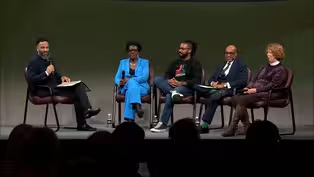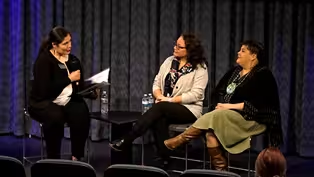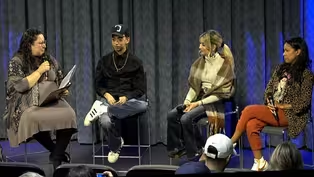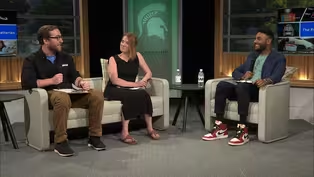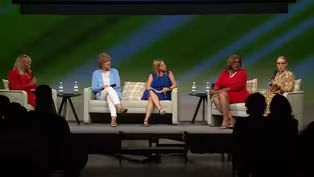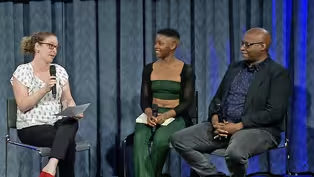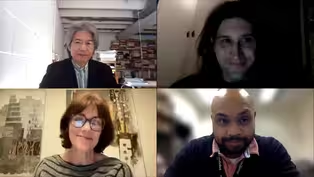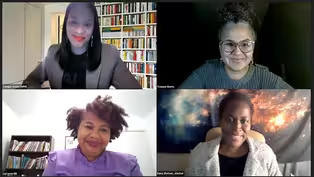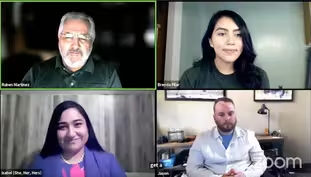
Panel Q & A - Benjamin Franklin
Special | 21m 46sVideo has Closed Captions
Panel discussion following the film Benjamin Franklin.
Panel discussion following the film Benjamin Franklin: Emily Conroy-Krutz, MSU Department of History Associate Professor (Field: 19th Century, Religious, Women & Gender) Katy Haas, Co-Producer of Benjamin Franklin Clay Jenkinson, humanities scholar, author, and social commentator
Problems playing video? | Closed Captioning Feedback
Problems playing video? | Closed Captioning Feedback
WKAR Specials is a local public television program presented by WKAR

Panel Q & A - Benjamin Franklin
Special | 21m 46sVideo has Closed Captions
Panel discussion following the film Benjamin Franklin: Emily Conroy-Krutz, MSU Department of History Associate Professor (Field: 19th Century, Religious, Women & Gender) Katy Haas, Co-Producer of Benjamin Franklin Clay Jenkinson, humanities scholar, author, and social commentator
Problems playing video? | Closed Captioning Feedback
How to Watch WKAR Specials
WKAR Specials is available to stream on pbs.org and the free PBS App, available on iPhone, Apple TV, Android TV, Android smartphones, Amazon Fire TV, Amazon Fire Tablet, Roku, Samsung Smart TV, and Vizio.
More from This Collection
Panel discussions following WKAR film screenings. Featuring filmmakers, policy makers, community partners and more.
Panel Q & A - The Cost of Inheritance
Video has Closed Captions
Panel discussion following the film The Cost of Inheritance. (30m 59s)
Video has Closed Captions
Panel discussion following the film Warrior Lawyers. (33m 42s)
Panel Q & A – First Voice Generation
Video has Closed Captions
Panel discussion following the film First Voice Generation. (31m 2s)
Video has Closed Captions
Panel following the film "American Jedi." Discussion features the film’s producers. (48m 46s)
Panel Q & A – NOVA Science Studio Showcase
Video has Closed Captions
WKAR showcases highlights from the NOVA Science Studio project. (53m 35s)
Panel Q & A – Building the Reading Brain
Video has Closed Captions
Panel discussion following the WKAR original film, Building the Reading Brain. (36m)
Video has Closed Captions
Panel discussion following the film Afrofantastic. Featuring filmmaker Julian Chambliss (29m 6s)
Panel Q & A – Free Chol Soo Lee
Video has Closed Captions
Panel discussion following the film Free Chol Soo Lee. (29m 48s)
Panel Q & A - Storming Caesars Palace
Video has Closed Captions
Panel discussion following the film Storming Caesars Palace (25m 19s)
Video has Closed Captions
Panel discussion following the episode Afrofuturism, from the Artbound series (33m 56s)
Panel Q&A - Brenda's Story: From Undocumented to Documented
Video has Closed Captions
Panel discussion following the film Brenda's Story (25m 44s)
Video has Closed Captions
Panel discussion following the film Unadopted. (31m 45s)
Providing Support for PBS.org
Learn Moreabout PBS online sponsorship- Hello and welcome.
I'm Amanda Pinckney, WKR Communications Manager.
I'm glad you could join us tonight for the screening of the clips from the new PBS documentary, "Benjamin Franklin".
As much as we'd love to see you all in person, we're thankful to have this opportunity to connect online in bringing this film fall by discussion.
Before we get started with the discussion, I have a few quick housekeeping notes, events like this from WKR are made possible with support from people like you.
Thank you to those who have donated WKR.
If you're not a WKR donor yet, you can do so at the donate to WKR link on this page or call 5,1,7,8,8,4,4,7,0,0 for tonight's discussion, please enter your questions for our panelists into the comment box, and I'll put them to the panelists as time allows.
Now, it's my pleasure to introduce our panel for tonight.
Emily Conroy-Krutz, MSU Department of History, she's an associate professor.
Co-producer of "Benjamin Franklin", the film.
Katy Haas.
And Humanity Scholar, Author, and Social Commentator, Clay Jkinson.
Thank you all for joining us.
(keyboard clicking) All right, so let's jump right in.
And Katy, can you tell us a little bit about the production and side of this film, how long it kind of took to get all the material, the research behind it, and how you guys chose what to focus on for Benjamin Franklin.
- Hi.
Hi Amanda.
Thank you so much.
And thank you to WKR.
Sure, this has been an amazing project to dive into, and to spend all this time in the 1700s.
We started work, research, and production on this film in about 2018.
And I came onto the project in the beginning of 2019.
We had already begun interviews and we had the great opportunity to interview an array of amazing scholars, including Clay, and we have read a whole lot of books.
We've talked with a whole lot of people, and then we spent, let's see, we began editing in Ernest in the beginning of 2020, and did most of this project in a sort of remote editing room fashion because of the pandemic.
But so, yeah, that's about a four year process.
It's sort of, sometimes I think works out to be a year or two per episode for a lot of our projects.
We, a lot of that time is research ahead of time, and conducting interviews and gathering stills in this instance a lot of paintings and etchings, and in other projects footage, but, there's a whole lot of gathering before we get to the editing room.
And then we really sort of spend a lot of time in there.
We really create the project.
- Wow.
I have a question from Andrew, he's asking, did "Mr. Burns find anything surprising about Ben Franklin in regards to his scientific endeavors?"
- You know, I think one of the greatest opportunities that we have when we create these films is to not just tell a story, not just tell an audience something about a person or whatever subject we've chosen, but to learn that ourselves.
And so, we don't often start the project knowing exactly what we're gonna create.
We go in and it's like an investigation, and we're learning a lot.
And so I think one of the things that we were all so impressed with was this great expanse of Franklin's interests.
And I mean, his hand was sort of in many, many fields beyond what, you know, a lot of us are working in one field, and he began his life as a printer, and then he became a scientist, and then he became a diplomat, and it was sort of remarkable to realize all of the ways in which he was involved in society, involved in our history, involved in our everyday lives when we look around us and see how electricity makes such a difference to all of us now, and allows us to connect in the ways that we do allows us to live our lives in the way that we do.
And to think about all of the ways in which he was instrumental in shaping that.
I think, you know, it's something that we had a sense of, but what was really compounded as we immersed ourselves in this.
- Thank you.
I have a question for Clay.
So, we hold these truths to be self-evident.
What was the significance of Benjamin Franklin's addition to Thomas Jefferson's writing in the Declaration of Independence?
- So Jefferson was on a committee of five.
Franklin was on it too and John Adams, and two others who dropped out, and Franklin wisely said, "He would never again, agree to write anything that was subject to committee review".
So Jefferson and Adams had to decide, Adams pushed Jefferson to write it partly because Jefferson was a Virginian.
So, Jefferson wrote the draft in a single day, Adams and Franklin approved of it almost entirely.
But Franklin is said that this is not documented, but it's probably true.
Jefferson had written, "We hold these truths to be sacred and undeniable", a little strange from a deist, but still, and Franklin said, "No, no, it's like 2 + 2 is 4.
It's self evident".
And so he then suggested that change.
It's one of the greatest changes that could have been made in that document.
And then finally, when Congress reduced Jefferson's draft by a quarter, this really upset Jefferson.
He was very thin skinned, and very proud of what he had done, and he liked his draft and he was angry that these egos were getting in the way.
And Franklin told Jefferson this weird and essentially pointless story about a sign maker named John Thompson, who had had a sign and his friends whittled it down.
And it was meant to sort of bring Jefferson off the cliff, but it's typical of Franklin because he had such good will.
He was a raconteur, he could disarm any tense situation with a story with a piece of humor.
Jefferson was essentially humorless, and Franklin sort of helped him understand that you don't get to have your draft untouched by John Hancock, and George Washington, and John Adams.
- That is really interesting, thank you.
Amy, I'm curious to know your thoughts on what role does Benjamin Franklin social ability play in the course of his life as a diplomat in States then?
- That's a fantastic question.
I think- to understand that you really need to think about sort of him in contrast to someone like John Adams, who is also there in Paris, trying to negotiate some of the Peace Treaty with the United States, and England, and France.
And he basically, John Adams is very difficult to get along with and does not want to play by the same kinds of roles, doesn't want to, is not able to get along in society in the same sort of way that Franklin is.
And so it's Franklin's ability to, you know, as Clay was talking about his sense of humor, his ability to share stories, his ability to get along with people.
And of course at, by that point, Franklin is world famous, and is charming, and is well known for his role as a scientist, and as a philosopher, in addition to whatever political role he has there.
And that helps tremendously when you are talking about, you know, getting France in the first place to support this cause, which is definitely a big ask, you know, siding with the United States against Britain is really going to be a challenge to begin with.
This is, you know, I talked to my students about this is a, we got David and Goliath situation here where the United States, no one would bet on the US at the beginning of this conflict.
And when you add onto that, the fact that, you know, the republicanism at the very heart of the American Revolution is going to be a real challenge to the center of the French government.
It's a hard ask.
And someone like Franklin is really helpful in greasing the wheels, and helping to sort of point to the ways that this is going to be beneficial to France as well, pointing to the ways that this is going to be, that this is a cause that they wanna get behind.
And putting him next to particularly, you know, undiplomatic diplomats really, I think makes that stand out even more, or someone like Adams, who, you know, the French eventually just won't even deal with.
Highlights what is so special about Ben Franklin?
- Amanda, I feel I almost have to defend poor Adams here from the slur that Emily- - Go ahead, go ahead.
- He was a difficult person, of course, very, very difficult.
But from his point of view, Franklin was lazy, Franklin was entertaining people.
He would get up around noon, then he'd have people for tea.
There were all these women floating around that he was flirting with in probably a harmless sort of way.
He never wanted to get down to the work.
Adams was a Puritan from New England, work, work, work, discipline.
They were just extremely different sorts of people.
And no two could have annoyed each other, but there was a night when they spent a night in the same bed together in New Jersey.
So that must have been one of the great moments in American history.
(Amanda laughs) - Yes.
- And I think that one of the things that we try to discuss is how well they sort of play off each other, and in a way, you know, one could be the foil for the other.
Benjamin Franklin was in part so well received maybe because, I mean, he was already very famous and he was well liked, but he was also very affable by comparison to an Adams.
- Yeah- - But, and I think in Adams' defense, I do think that he understood, he understood their personalities and their differences in how they could work to an extent that he had a sense of humor.
And especially in telling the story that Clay has mentioned.
- Oh yes, yeah.
- There's this other one, and I can't quote it, but when Ken Burns contacted me, it's such a thrill, and an honor to be asked by Ken Burns to be- he can ask anyone on earth to be in his films and they all say, yes.
So if he reaches this far down to find someone like me, I was so thrilled.
And I went into training for this.
I'm really just a Jefferson Scholar and a Lewis and Clark Scholar.
So I trained for months for this, and I memorized things, and I had timelines, and cards, and, you know, I fretted all the way to New Hampshire.
And there was this great passage where Adams who didn't like Franklin says the greatest thing ever said of Franklin.
He said that, "He was universally loved.
He was better known than Leibniz and Newton, that scullery wenches and valet de chambres knew him, footman and coachman.
And they looked up at him as he were bringing back the Golden Age", and coming from Adams, this is just a spectacular tribute to really the first global citizen, Benjamin Franklin.
- I, like that global citizen.
That kinda leads into my next question on, like, what do you think is Benjamin Franklin's greatest legacy?
Amy, do you wanna start with that?
- Emily.
- Or anyone?
- Yeah I, for me, actually, it is sort of the I think ironic, given that he is sort of the American global citizen, is that he helps to create the American character.
And so what, you know, how I start with my American Revolution class with two portraits of Franklin, one from the 1760s, and then the one that we're more familiar with with the coonskin hat, from much later.
And it's how do we get from this picture of Franklin as the gentleman scientist with the powdered wig in the 1760s, where he is so very much wanting to be a British aristocrat, and to be understood in that world, and to be sort of seen as sort of reaching that level.
To Franklin as the embodiment of American simplicity and republicanism who is gonna be, you know, bareheaded and wearing that hat.
And he very deliberately created this understanding of, you know, this is sort of American simplicity, American industriousness, American sort of the self-made man.
And that is I think really a politically and diplomatically incredibly important in the 18th century context.
And then, you know, long term that is still, I think, speaks to the core of what a lot of people talk about when they're talking about the American dream and sort of what, you know, the beautiful parts of American character come back to what Franklin was trying to present to the world as this is the United States.
- Nice.
Katy, do you have anything to add to that?
- Oh, I think Emily said it very well, but I think, I mean, his, one of the things that I'm continually struck by as we work on this project is sort of the ways in which Franklin had such a hand in shaping things that we continually are referring back to the documents, the ideas of who we are as a nation, you know, again, this idea of what it is to be an American.
He really, I just see his hand in that in so many ways.
And this goes, this is, you know, very obviously in the documents that he was involved in, but, you know, in the Constitution, after the Constitution, the Declaration of Independence.
Although all of the treaties that he helped create that got us to be an independent nation completely.
But even further, if you go back and you see his curiosity and his willingness to engage in the idea of commonwealth and then as a postmaster, his ideas around connecting us what we're 13 disparate colonies.
And he sees how we might do well to work together and not just be in conversation with London alone, and how we can, you know, have post roads, and he's involved in proposing the Albany Plan of Union.
And you just sort of can go back and back and back, and so much of what he did as a person, how he lived, the things that he really believed in I think continually show up in our sort of common discourse of what we are as a nation.
- Amanda, you know, two biographies of Franklin sort of sum up his legacy.
The great H.W.
Brands called him, "The first American", and in some respects, that really is what he represents.
But even maybe more interesting as Gordon Wood, "The Americanization of Benjamin Franklin".
He was born a British citizen; he thought of himself as British.
He's more British in many ways than Thomas Jefferson or John Adams.
And yet he was forced by circumstance to rethink his allegiances, both personal disappointments and the way that colonies were being treated.
And he went on then to become so extraordinarily important in many different places of the founding.
And remember at the end of the constitutional convention, he was elderly and ill, had to be brought in on a sedan chair by prisoners from the Walnut Street Jail.
And at the very end, the wife of the mayor of Philadelphia, when they finally came out of their secrecy, she said, "Dr. Franklin, what have you given us?
", And he paused in his usual way.
And he said, "A Republic, if you can keep it.
", that's the question we are now facing as a people, a Republic, if you can keep it.
- Thank you.
Now, what we watched talked about famous euphemisms from Franklin.
Do you guys have any?
- I'll go first, "Fish and visitors stink after three days".
- Universally true.
- [Katy] That is.
That is a very good one.
- Yeah, that was gonna be mine Clay.
So you've stolen it.
(group laughing) - Well, he had a lot of- and I think my favorite is maybe less, less quippy and less well known, but it has really spoken to me, and I think that it sort of speaks to Franklin's character as well, which is, "The wise and brave dares own he was wrong".
And when I've, well, you know, I think that that's something that's a good thing for all of us to keep in mind.
And, also something that I think about in the ways Franklin did continually reinvent himself, and try to improve upon himself.
And I think that that's a good one.
That's one that I really enjoy.
- Or how about right now, Franklin, "There is no good or bad peace"?
- That's a very good one.
- That's nice.
Do you think America would have prevailed in the American revolution, if not for Benjamin Franklin?
- One word answer, yes.
(indistinct) to hear Emily thinks she teaches.
She teaches- - Yeah, I was gonna, I was trying to figure out a way to say more than yes, but yes (laughs).
And I think that, you know, this is the challenge of thinking through big questions like this with biography, cause biography is one of my absolute favorite genres, cause it invites us into a time period, into a whole world through the story of, you know, one person's narrative, which is wonderful.
And is really an immersive way of getting into the story.
But you know, the risk is that we then sort of see the world so much of this person's life that we can, you know, overstate, the importance of them.
So I mean, Franklin certainly it would have turned out in different ways if it were not for Franklin.
Franklin, I think was an incredibly key part of the way the peace process worked out for sure.
I think Franklin also played a big part in the way that the British responded to the Americans in the 1760s, cause he is in London in that period.
And so he is the individual who is there sort of having to take all of the questions from parliament about why are the Americans revolting in this way?
So certainly those moments would've played out differently.
But I think that these, the big questions that Franklin was wrestling with, you know, that, that Clay was talking about a moment ago about, you know, making that transition from being a British subject, to being an American citizen, all sorts of people were going through that.
And if it hadn't been for him, someone else would have figured out some other way of, of working it out.
So it is, it's certainly interesting to ponder, you know, what that might have looked like, and how sort of individual moments might have played out differently.
But you know, ultimately that, the movement that was the American Revolution is much bigger than any one individual.
- Amanda, your question would've made John Adams' head explode.
(Amanda laughing) Made a long list of people who were overrated and Franklin was right up at the top for him.
And you know, Jefferson said "An island cannot govern a continent", that it was inevitable that we were going to become independent maybe later, maybe sooner.
But that Jefferson would say, "No single human being played a critical role in this, that this was really part of the dynamics of human aspiration".
- Right.
Thank you so much.
That is all the time we have for tonight.
Thank you.
I know, wish we could keep talking.
Thank you to all our panelists for your time and contribution to our conversation.
We hope you enjoyed the presentation.
Stay safe, everyone.
- Thank you so much.
- [Clay] Thanks.
- [Emily] Thank you everybody.
Support for PBS provided by:
WKAR Specials is a local public television program presented by WKAR
